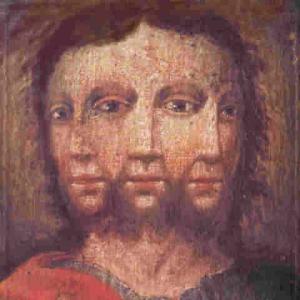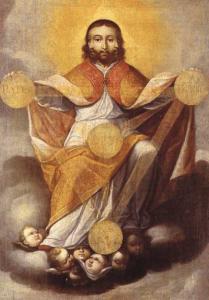 This Sunday in the church year often brings with it some rather absurd attempts to prove that the Holy Trinity was prefigured at various places in the Hebrew Bible. Perhaps the most egregious of those attempts is to find the so-called “Trisagion” (the three holies) uttered by the flying seraphim surrounding the temple throne in Isaiah 6:3, a direct announcement of the trinity of Father, Son, and Holy Spirit. This, I find, to be laughable, no matter how many desperate Christian commentators have made the claim. Then there are the enigmatic plural references to divinity in Gen.1:26, 3:22. Especially the interpreters of the early centuries of the church seized on these texts and assumed that God was speaking to Godself as the trinity. Well, what else could it be, they reasoned, poorly?
This Sunday in the church year often brings with it some rather absurd attempts to prove that the Holy Trinity was prefigured at various places in the Hebrew Bible. Perhaps the most egregious of those attempts is to find the so-called “Trisagion” (the three holies) uttered by the flying seraphim surrounding the temple throne in Isaiah 6:3, a direct announcement of the trinity of Father, Son, and Holy Spirit. This, I find, to be laughable, no matter how many desperate Christian commentators have made the claim. Then there are the enigmatic plural references to divinity in Gen.1:26, 3:22. Especially the interpreters of the early centuries of the church seized on these texts and assumed that God was speaking to Godself as the trinity. Well, what else could it be, they reasoned, poorly?
I readily admit that this talk of God as trinity, however hallowed it has been by theologians and liturgical students through the centuries, bears no actual import for me. God is God, Jesus is God’s adopted child, no co-equal divine being with God, and the Spirit is God’s nickname when God is in the business of acting God like. I do not wish to impugn your belief in any way, but this talk of trinity frankly leaves me unmoved and confused at best. So what to do with Trinity Sunday?
The Hebrew Bible text for today offers one of the most astonishing and most potentially valuable myths that one may find in the biblical record. I have spoken about this text in my companion blog, “The Peripatetic Preacher,” in a six-part series on the Bible and climate change. I will repeat some of what I said there since it bears repeating, I think. As we face environmental disasters of unimaginable kinds, we preachers need biblical resources to help our congregations support theologically their efforts in this crucial fight, a struggle quite literally for the survival of all living things on the planet.
I know well just why Proverbs 8 has been chosen as a text for this Trinity Sunday. It contains the myth of the preexistence of Woman Wisdom, one created, as the myth goes, before anything else was made by the hand of YHWH. Thus, when this woman calls out to us in Prov.8:1-4, it is Woman Wisdom, the preexistent confidant of God, who is calling. Given that story, it would do us well to heed such a call, issuing as it does from a divine figure. This preexistence myth is picked up in the New Testament at several places, most prominently in the Gospel of John, whose Jesus is clearly created at the beginning of all things, and who announces the coming of the “Spirit of truth” at John 16:12-15, the new Testament text for this Sunday. The letter to the Hebrews and the post- Pauline letter to the Colossians also assume a preexistent Jesus. The myth enshrined in Proverbs thus wends its way down the centuries of biblical writing and finds one possible outcome in the Trinity of Christianity.
I perhaps should not need to explain what I mean by “myth,” but I will do so anyway, since this word has a way of slipping into meanings that it simply does not possess. “Myth” does not equal “lie” or “falsehood” or “untruth”. A helpful phrase to remember is: “History is true once, but myth is true forever.” I might alter that phrase a bit by saying that not all myths are true for very long. For example, there is the current myth that economic socialism is evil and far inferior to economic capitalism. “Socialism” as the economic system represented in the collapsed Soviet Union, coupled as it was with tyranny and genocide, was certainly evil, but the idea of socialism as a system itself is not then forever tarred as evil. And the greed capitalism that drives so much of our American economy in the 21st century does not in itself make capitalism evil either. But the myth among many Americans persists. Why else would so many conservative voters speak of Bernie Sanders’ announced socialism as the epitome of evil? Here the myth has clearly overwhelmed the historical reality and has taken on a mythical life of its own.
Hence, the myth of a preexistent Woman Wisdom in Proverbs is by no means a historical reality, provable by the usual canons of historical research. She is a myth, but a most helpful and productive one for those of us concerned with the failing environment and our continued involvement in that failure. I will translate a few of the lines of the text to indicate the real power of this myth for our time.
22) YHWH birthed me at the beginning of God’s way, God’s most ancient work from long ago.
23) Long ago, I was poured out, first, before the ancient earth.
A check of the NRSV demonstrates several quite different readings of these two verses, and those differences are very significant. The verb translated “birthed” in 22a is read in NRSV as “created”. But in Gen.4:1 the verb is used to describe the birthing of Cain by Eve, and at Gen.14:19, 22 the verb proclaims that YHWH birthed the skies and the earth. The image is clearly a feminine one. At Prov.8:23a, the NRSV reads “set up” for my translation “poured out,” the more common meaning. I would suggest that in the light of the obviously feminine cast of vs.22, the reading “poured out” might refer to the breaking of the waters in the process of birth. Thus, God, as mother, gives birth to Woman Wisdom at the “beginning” (the very first word in the book of Genesis) of God’s way. This birth was in fact the very first act of God, even before the creation of the earth.
This is made clear by the next verse, Prov.8:24.
24) When there was no Tehom, I was birthed, before there were springs awash with water.
I have retained the Hebrew Tehom, because its translation is not easy. The usual reading is “deep” or “depths” (NRSV), but it is an obvious reference to the more ancient myth of creation of the Babylonians, where Tiamat (note the identical consonants), goddess of the salt waters, mates with Apsu, god of the fresh waters, and gives birth to all the lesser gods and goddesses of the Babylonian divine pantheon. Tehom is the “deep” that exists at the beginning of God’s creation of the world in Gen.1:2. Woman Wisdom was birthed even before the movement of God over the “surface of the deep.”
But, I hear you ask, what has all this myth making to do with the struggle for a better environment in the 21st century? Prov.8:30-31 will provide something of an answer.
30) I was beside God as a confidant; I was a daily delight,
rejoicing before God always,
31) rejoicing in the whole creation, and delighting in the human race.
Woman Wisdom has been birthed by the mother God to be an advisor, one who shares in the creative work of God and who then invites her followers to enter into the joys of that work. NRSV’s reading of “master worker,” instead of my “confidant,” is based on only one disputed text at Jer.52:15. My reading makes the point that Woman Wisdom is both witness and advisor to creation and then one who celebrates in it.
And she does not merely rejoice over humanity; she is equally concerned for the “whole creation.” The author of Proverbs here uses two nouns, tevel and erets, that together, I suggest, mean “whole creation,” the non-human part of God’s creation of the universe. Hence, Woman Wisdom’s delight and joy are in the whole cosmos, the creation which she has just witnessed and celebrated along with her partner, God. As a sidelight, is it possible that the imaginative author of these words might have had those divine plurals in Genesis in mind as the myth of Woman Wisdom was created? Might then God be speaking to her when the creation of human beings is announced in Gen.1?
The grand myth of Woman Wisdom, birthed by the mother God as confidant in creation, as witness to and celebrant of that creation, calls her followers to join her in that joy and celebration. Rather than be controllers of the creation of God, masters over it, Woman Wisdom calls us to joy and pleasure in its service and protection (Gen.2:15). This is a myth well worth our reflection and embrace as we seek to address the monstrous dangers of a climate grown too hot, an environment no longer comfortable for all who find their homes in it.
(Images from Wikimedia Commons)











